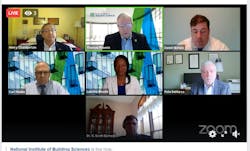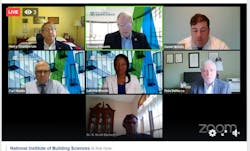NIBS Town Hall Outlines Steps for Reopening
(WASHINGTON, DC, May 12, 2020) – Reopening the nation’s businesses will require a uniform approach by building operators, infrastructure employees, and local and state officials under the safety guidance of the Centers for Disease Control and Prevention.
“Bringing America back to work will take planning, vision, and expertise,” said Lakisha A. Woods, CAE, President and CEO of the National Institute of Building Sciences (NIBS). “Employers must utilize a phased approach to bringing staff back into the workplace to assist with social distancing.”
On May 7, NIBS hosted a COVID-19 Virtual Town Hall: "Preparing for Reentering Buildings". The online event was the first in a series aimed at informing and engaging the built environment around concerns and challenges with COVID-19.
Drawing more than 1,800 registrants, the virtual town hall panel included Henry H. Chamberlin, president & chief operating officer, Building Owners & Managers Association (BOMA); Daniel Nichols, assistant director of fire/life safety, Metropolitan Transportation Authority, Metro-North Railroad (MTA); Pete DeMarco, executive vice president of advocacy and research, International Association of Plumbing and Mechanical Officials (IAPMO); Thomas H. Phoenix, Principal, CPL Architects & Engineers, PC; treasurer, NIBS Board of Directors; Fellow, ASHRAE; and G. Scott Earnest, PE, CSP, PhD, acting director for the Office of Construction Safety and Health at the National Institute for Occupational Safety and Health (NIOSH). The event was moderated by Carl Hedde, head of insurance practice at One Concern, and chair of the NIBS Board of Directors.
There are a number of complex issues that should be considered as part of a reentering strategy:
- Proper hygiene and hand-washing, social distancing, and face coverings in public areas remain critical. Office seating density must be thinned out;
- Elevators should not exceed more than 4 people at a time, depending on the size of the elevator cab;
- Companies should perform an audit of the HVAC system, making improvements where necessary. If possible, increase outdoor air ventilation and reduce recycled air flow;
- Buildings that have sat empty must flush stagnant water and replace it with fresh utility water;
- When it comes to transportation and transit systems, cleaning must be accomplished in concert with disinfection. Social distancing and face coverings remain the best ways to avoid virus transfer.
BOMA’s Chamberlin emphasized the importance of staggering a reentering workforce. He proposed maybe only 30 percent of the workplace show up to the office for the first month. “Crowd control will be a real challenge when it comes to reentering the workplace,” he said.
Different businesses will have different needs, and each must be in a position to empower employees to perform work in a safe and healthy atmosphere.
To view the recording and see the session notes of the virtual town hall, visit https://www.nibs.org/page/covid-19-virtual-town-hall.
The next virtual town hall is scheduled for Tuesday, May 19, 2020.
About NIBS
National Institute of Building Sciences brings together labor and consumer interests, government representatives, regulatory agencies, and members of the building industry to identify and resolve problems and potential problems around the construction of housing and commercial buildings. NIBS is a nonprofit, non-governmental organization. It was established by Congress in 1974. For more information, visit nibs.org or follow @bldgsciences on Twitter and Facebook.
For more, contact Christine Cube, [email protected].

